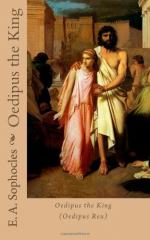|
This section contains 8,700 words (approx. 29 pages at 300 words per page) |

|
SOURCE: “Asserting Eternal Providence: The Question of Guilt,” in The Theatre of Apollo: Divine Justice and Sophocles's “Oedipus the King,” McGill-Queen's University Press, 1996, pp. 45-58.
In the following excerpt, Griffith examines the cases for and against Oedipus and explains why he is guilty of murder.
On the last occasion I had the good fortune to read E. R. Dodds' famous essay “On Misunderstanding the Oedipus Rex,”1 I felt certain misgivings at some of his conclusions. Dodds is denouncing a view that he discovered in some undergraduate essays on the question “In what sense, if in any, does the Oedipus Rex attempt to justify the ways of God to man?” The offending view2 holds that “we get what we deserve”3—that is, that Oedipus in some measure merits his suffering. Dodds' position in answer to this has an ethical aspect (Oedipus has an “essential moral innocence”4), a religious one...
|
This section contains 8,700 words (approx. 29 pages at 300 words per page) |

|


